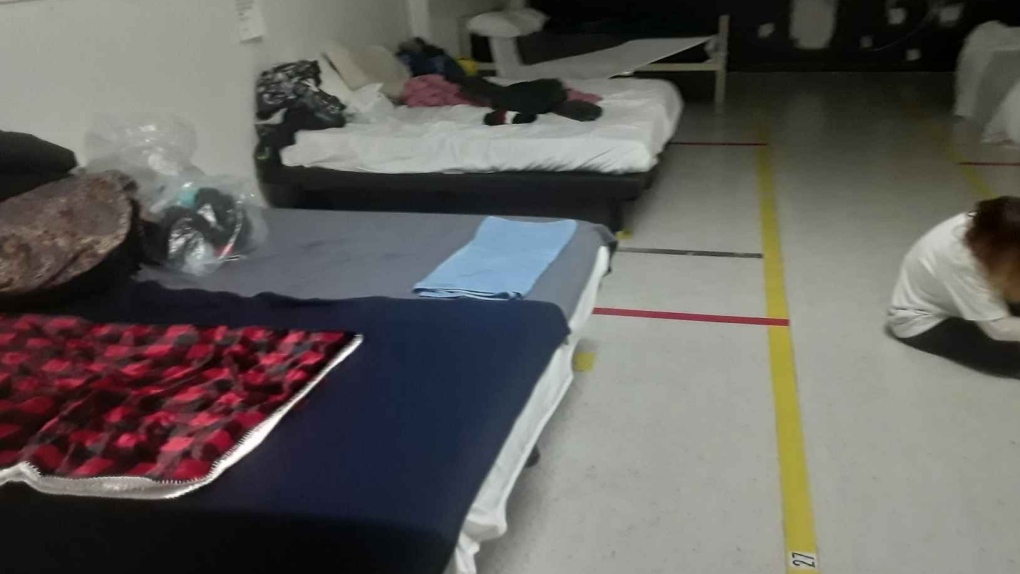Toronto sidelines infection control recommendations in favour of increasing shelter capacity as temps drop
 Jennifer Palligo, a Toronto woman, is seen sleeping outside this winter as temperatures drop below zero.
Jennifer Palligo, a Toronto woman, is seen sleeping outside this winter as temperatures drop below zero.
Toronto Public Health recommendations for infection control in city-run shelters that were meant to be in place for “several years” have been sidelined in favour of increasing capacity as winter seizes the city.
Documents obtained by advocates through freedom-of-information laws and shared with CTV News Toronto show the agency advised the city in June to keep temporary shelter hotels open in order to encourage physical distancing until at least the end of 2023.
Now, six months later, TPH says it has pivoted to providing care in “less-than-ideal spaces,” with the city moving beds closer together and closing shelter hotels as the bitter cold heightens the already urgent need for shelter space.
Beneath a cement staircase in downtown Toronto, Jennifer Palligo, recently evicted from a shelter hotel, wrapped herself in a pink blanket as temperatures plummeted below zero on Tuesday night.
“I just feel very depressed,” she said. “What am I supposed to do?”
“I called central intake and there’s no beds. Why did they close the hotels? It’s getting cold. Why would they close the hotel shelters and then there’s less beds for everybody?”
TPH’s initial recommendations aimed to stay in place for several years and constitute the “new normal” post-COVID-19, but within months, that trajectory was altered as temperatures began to drop.
PUBLIC HEALTH RECOMMENDATIONS
In the internal document, TPH outlined recommendations on “post-pandemic” health measures for shelters, penned by TPH’s Associate Medical Officer of Health Dr. Alexa Caturay and Practice Health Check’s (PHC) Chief Medical Officer Dr. Kevin Katz.
The documents acknowledge there are “operational and budgetary considerations” at play for the city and suggest a list of mitigation strategies in the event that density must increase.
“Maintain spaces which enable single occupancy and privacy to maintain overall health and dignity” and “eliminate bunk bed accommodations and dorm-style rooms,” are listed at the top of their recommendations.
“These measures will likely be required for several years and will constitute the ‘new normal’ post-COVID. They should be re-evaluated on at least an annual basis beginning at the end of 2023,” the document concludes.
Currently, the city is in the midst of closing up to five of their 27 pandemic-era shelters by the end of this year. They are also moving forward with pushing shelter beds closer together to make room for more occupants.
To reduce transmission at the onset of the pandemic, the city began offering hotel rooms as shelter sites. These accommodations primarily offer single rooms in hotels and motels – a rarity in the shelter system.
 A photo is taken inside of a Toronto shelter in December 2022. Approximately 2,500 of the city’s 2,900 hotel shelter spaces offer single rooms, according to Gord Tanner, general manager of Toronto's Shelter, Support and Housing Administration Division.
A photo is taken inside of a Toronto shelter in December 2022. Approximately 2,500 of the city’s 2,900 hotel shelter spaces offer single rooms, according to Gord Tanner, general manager of Toronto's Shelter, Support and Housing Administration Division.
Tanner said traditional shelters are made up of a mixture of double, triple and quadruple bed rooms, along with dormitory style setups in some of the older spaces.
CITY OF TORONTO RESPONSE
The City of Toronto announced its 2022/23 Winter Services Plan for people experiencing homelessness in October. The plan detailed the addition of roughly 500 shelter spaces by reducing the distance between beds from two to 1.25 metres. Prior to the pandemic, the distance between beds was .75 metres.
A spokesperson for the city said their decision to move shelter beds closer together was discussed directly with senior leadership at TPH and PHC.
The city did not provide documentation confirming the public health officials were onboard, despite several requests from CTV News Toronto.
“We've been sharing with [TPH] our challenges with respect to demand and that balance between keeping people safe and indoors versus not,” Tanner said.
“Given the winter pressure, the risk of keeping people outdoors trumps some of the measures that were implemented and guided us in March and in April of 2020.”
Echoing weather concerns, TPH said they’re having to prioritize protection against the extreme cold, which they say poses “an even greater risk to health and wellness of those living outdoors” than the threat of viral spread.
According to the city’s latest data, an average of 168 people are being turned away from the shelter system on a daily basis while an average of 8,227 people are sleeping at shelters overnight.
“TPH is working with the Shelter Support and Housing Administration and shelter operators to reduce risk and enable access for those who need shelter to prevent the harms associated from exposure to the elements,” a TPH spokesperson said.
PUBLIC HEALTH PERSPECTIVE
In the interim, people experiencing homelessness are faced with a seemingly impossible decision, says Doug Johnson Hatlem, a street pastor at Sanctuary Toronto.
“Do I go somewhere where I might catch a particularly bad version of the flu or COVID or RSV? People have to choose whether to be in a place against public health recommendations or outdoors in the cold. It’s not a real choice,” he said.
Dr. Naheed Dosani, health equity lead of Kensington Health in Toronto, told CTV News Toronto that closing shelter hotels and cramming more beds into existing shelters also has the potential of putting more people at higher risk of viral exposure, which could place more strain on hospitals as they face an “unprecedented healthcare crisis.”
“Ultimately the solution here is to ensure everyone has adequate access to housing, but in the meantime, we have an acute catastrophe on our hands. Winter is coming, people are being turned away on a daily basis and city staff are clearing out encampments, where are people left to go?”
“This has the potential to be a humanitarian crisis this winter if we do not see change.”
On the streets of downtown Toronto, Palligo is mindful that the worst of the winter is still to come.
“I have a sleeping blanket but it’s obviously going to get colder,” she said.
“It’s hard to live on the street. It’s hard to lose everything.”
CTVNews.ca Top Stories

WATCH LIVE Canadian government to make border security announcement today: sources
The federal government is set to make an announcement on new border security measures after question period today.
Fall sitting bookended by Liberal byelection losses, ending in tumult for Trudeau government
The House of Commons is slated to adjourn on Tuesday, bringing an end to an unstable fall sitting that has been bookended by Liberal byelection losses. The conclusion of the fall sitting comes as Prime Minister Justin Trudeau's minority government is in turmoil.
Suspect in Gilgo Beach serial killings is charged in the death of a seventh woman
The New York architect facing murder charges in a string of deaths known as the Gilgo Beach killings was charged on Tuesday in the death of a seventh woman.
W5 Investigates How a convicted con artist may have exploited Airbnb's ID checks in rental scams
In part two of a W5 investigation into landlord scams, correspondent Jon Woodward looks at how hosts on Airbnb may be kept in the dark about their guests' true identities – a situation that a prolific Canadian con artist appears to have taken advantage of.
Number of family doctors in Canada now growing at a slower pace: report
Canada is facing a growing crisis in its health-care system as the rate at which family doctors are growing has slowed, according to a recent report.
Alcohol is not good for us. 5 tips to stay safe(r) if you drink
The holidays and New Year’s Eve are fast approaching, and for many, that means alcohol-infused festivities and gatherings to navigate.
Sex-ed group deemed 'inappropriate' by Tory government returns to N.B. schools
A sexual-education group whose presentations were deemed "clearly inappropriate" by the previous New Brunswick Progressive Conservative government has been cleared to return to the province's schools.
'She will not be missed': Trump on Freeland's departure from cabinet
As Canadians watched a day of considerable political turmoil for Prime Minister Justin Trudeau and his government given the sudden departure of Chrystia Freeland on Monday, it appears that U.S. president-elect Donald Trump was also watching it unfold.
Two employees charged in death of assisted care resident who ended up locked outside building overnight
Two employees at an Oshawa assisted living facility are facing charges in connection with the death of a resident who wandered outside the building during the winter and ended up locked outside all night.


































